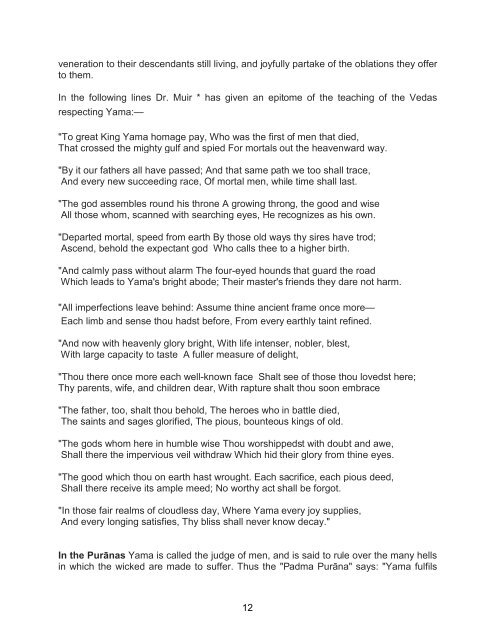KathaUpanishad
Create successful ePaper yourself
Turn your PDF publications into a flip-book with our unique Google optimized e-Paper software.
veneration to their descendants still living, and joyfully partake of the oblations they offer<br />
to them.<br />
In the following lines Dr. Muir * has given an epitome of the teaching of the Vedas<br />
respecting Yama:—<br />
"To great King Yama homage pay, Who was the first of men that died,<br />
That crossed the mighty gulf and spied For mortals out the heavenward way.<br />
"By it our fathers all have passed; And that same path we too shall trace,<br />
And every new succeeding race, Of mortal men, while time shall last.<br />
"The god assembles round his throne A growing throng, the good and wise<br />
All those whom, scanned with searching eyes, He recognizes as his own.<br />
"Departed mortal, speed from earth By those old ways thy sires have trod;<br />
Ascend, behold the expectant god Who calls thee to a higher birth.<br />
"And calmly pass without alarm The four-eyed hounds that guard the road<br />
Which leads to Yama's bright abode; Their master's friends they dare not harm.<br />
"All imperfections leave behind: Assume thine ancient frame once more—<br />
Each limb and sense thou hadst before, From every earthly taint refined.<br />
"And now with heavenly glory bright, With life intenser, nobler, blest,<br />
With large capacity to taste A fuller measure of delight,<br />
"Thou there once more each well-known face Shalt see of those thou lovedst here;<br />
Thy parents, wife, and children dear, With rapture shalt thou soon embrace<br />
"The father, too, shalt thou behold, The heroes who in battle died,<br />
The saints and sages glorified, The pious, bounteous kings of old.<br />
"The gods whom here in humble wise Thou worshippedst with doubt and awe,<br />
Shall there the impervious veil withdraw Which hid their glory from thine eyes.<br />
"The good which thou on earth hast wrought. Each sacrifice, each pious deed,<br />
Shall there receive its ample meed; No worthy act shall be forgot.<br />
"In those fair realms of cloudless day, Where Yama every joy supplies,<br />
And every longing satisfies, Thy bliss shall never know decay."<br />
In the Purānas Yama is called the judge of men, and is said to rule over the many hells<br />
in which the wicked are made to suffer. Thus the "Padma Purāna" says: "Yama fulfils<br />
12


















